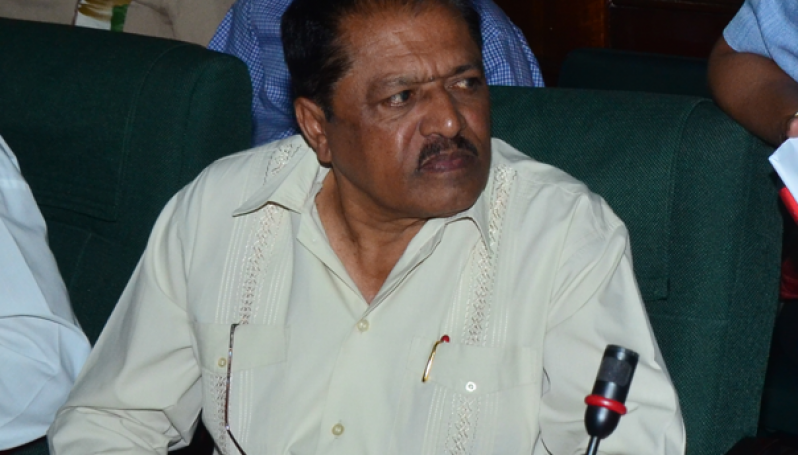– allows farmers to take part in market economy
GUYANA is on the path of developing a viable and vibrant agriculture sector by being food secure, declared Minister within the Agriculture Ministry, Ali Baksh, during his presentation on the 2014 Budget in the National Assembly last week.
He said, “We recognise that food security and safety is important, Guyana has been leading the way in the Region with respect to chemicals management, where several outreaches and seminars were held to educate farmers on the use of chemicals. This was a significant aid during the paddy bug outbreak in 2013.”
Minister Baksh pointed out also that his ministry has commenced a sustainable shift from subsistence agriculture to a productive agricultural industry that allows farmers to take part in the market economy.
The agriculture sector has largely been the vehicle that has propelled Guyana forward and will play a pivotal role in Guyana being a high middle-income country by 2020 – Baksh
“Such a shift will involve far-reaching structural changes to boost production, productivity and eventually incomes for farmers and co-operatives alike,” Baksh said.
He added that climate change is a major feature in this shift.
“The year 2013 was a difficult year for Agriculture, taking into consideration the vulnerable weather patterns we experienced. As a result, Mr. Speaker, the ministry had to extend additional services in all Administrative Regions of our country.
Early Warning System
“…weather forecasting is even more important today because of the impact of climate change. Agriculture is very sensitive to weather and climatic conditions. An Early Warning System is being developed to make farmers more aware of weather predictions and how to apply these to agriculture planning of crops and livestock.
“…this Honourable House would agree that we faced many challenges in the sugar industry due to the recent cycles of dry and flood-like conditions, managerial problems, lack of adequate human resource and the need for advance technologies…. on the other hand, Mr. Speaker 2013 was a favourable year for rice production.”
Minister Baksh explained that some of the measures being taken to address agricultural operations, in light of the impacts of climate change, include the promotion of shade house cultivation as a mechanism to intensify vegetable production on a year-round basis.
He said, “Demonstration farms were established at St. Ignatius, Sandhills, Moraikobai and Tarlogie. Structures were also established at Onderneeming and at Hope Estate. Also, several schools in various parts of the country are involved in same.”
Baksh pointed out that the cycle of change in and around the seacoast are ongoing and siltation continues to be a serious hindrance for the free flow of water through the sea sluices.
“This continues to require extensive maintenance works… this Honourable House would agree with me that there is much need for an increase in financial and material support for this sector,” he said, adding that there are several other measures being undertaken to battle the impacts of climate change.
Empowering Farmers
On the issue of supporting and empowering farmers in the sector, Baksh explained that in 2013 the National Agriculture Research and Extension Institute (NAREI) continued to work in farming communities throughout the country to share appropriate technology to improve production/productivity of non-traditional crops.
He said, “Emphasis was also placed on the management of Acoushi Ants in Regions 1, 7, 8 and 10 as well as in other communities such as Moraikobai and the Linden/Soesdyke Highway.
“Support was provided to the Blue Flame Women’s Group in Region 1 to enhance their value-added cocoa products. From other interventions made, there has also been an increase in ginger production, especially from Region 1.
“In excess of 5,000 farmers benefitted from crop production practices, fertilizer and disease management and nursery practices training sessions. Three large scale cassava farms have been established in Region 9 (Parakuarananu, Massaree and Rupertee). The management of the Black Sigatoka disease affecting plantains was also given prominence.”
Baksh underscored the fact that agriculture in Guyana accounts for more than 33 per cent of total employment and 25 per cent of GDP.
He said, “There has been increasing investments in agriculture – with support to farmers and domestic investors, thus creating an increase in production and improved living standards. Moreover these production increases are being conducted in an environmentally friendly and socially sustainable manner in the face of climate change. We acknowledge that our farm systems and techniques can benefit from modernization, including the use of biotechnology.”
Baksh stated also that training of some 1,247 farmers in Regions 2, 3, 4, 5 and 6 in the areas of calf management, signs of heat in cattle, duck production techniques, broiler management, swine improvement, foot rot management, artificial insemination, piglet management etc., were also done.
He said, “Some 661 farmers benefitted and 52,557 animals were treated across the main rivers and creeks.”
The agriculture sector has largely been the vehicle that has propelled Guyana forward and will play a pivotal role in Guyana being a high middle-income country by 2020, Baksh stressed.
(By Vanessa Narine)



.jpg)









